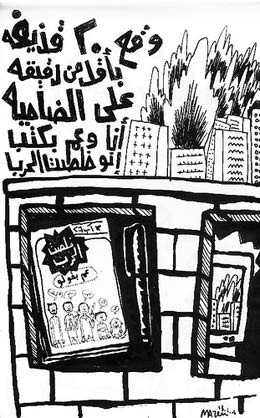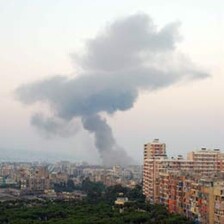Beirut 14 August 2006

“Today’s Joke”: 20 bombs/in less than one minute/on the southern suburbs/while I am writing/that the war is over by Mazen Kerbaj. View more of his work.
At 2:45 pm on Sunday, Beirut endured twenty bombing attacks in the space of two minutes. Facing south from our balcony on the American University of Beirut campus, the incessant explosions reminded me of a Fourth of July fireworks finale on steroids. I almost expected to see a glittering star-spangled banner on the southern horizon. Of course, this was an experience brought to us by US-made ordnance. As the bombs strike the residential neighborhoods of southern Beirut again and again, it is strange that no UN resolution demands that the supplier of these weapons cease to deliver them to Israel. On Saturday, thousands of leaflets fell from the sky, littering West Beirut; they depicted Nasrallah poking his head out of a cedar tree and urged us to get “the destroyer of Lebanon” off of our backs. When, a day later, Beirut experienced the most intense bombing of the war, did the Israeli psych-ops people expect us not to notice that the same country dropped the leaflets and the bombs? For all but the most subtle, that country seemed the obvious candidate for “destroyer of Lebanon.” During the deafening two minutes, children were screaming and we could see hundreds of birds, shaken from their roosts, taking flight simultaneously, in a completely random pattern that resembled a colossal swarm of bees. I suppose we hope that was the finale, and that the old war, now sated, can simply expire.
As we wait around the war’s deathbed, there are disturbing signs of life. Reports that Hezbollah may not accept what its cabinet ministers recently voted to accept. And then, in a CNN interview Sunday evening, Former Israeli Prime Minister Ehud Barak suggested that Israel should not be accused of breaking the cease-fire if it attacks vehicles that it suspects of transporting weapons to Hezbollah. If this is true, it means that Israel reserves the right to control Lebanon from the air, to treat it like the Gaza Strip. And we thought the patient was dying.
Israeli leaders seem desperate to claim some measure of victory. Shimon Peres predicted Sunday that Hezbollah will end the war “with its tail between its legs.” But this macho posturing was soon betrayed when he admitted “It’s not easy to handle this type of situation, as proven by what is happening in Iraq with the Americans with their 150,000 soldiers and a billion dollars a day of spending … ” Now, there is a damning comparison! Will Israeli leaders learn from it and come to the table ready to deal with Arab concerns, or will they pour good money after bad, continue their “defensive” operations, and watch the Levant go the way of Mesopotamia?
And if the war is indeed dead by the morning, can we bury it? My impression is that Lebanon, though defiant, is washed over by a sea of sadness, a feeling of emptiness, shocked again to see that people can cause such endless hurt. How can there be any sense of triumph? Killing Israeli civilians provided no protection for Lebanon. And what about the dead children of Qana and the roadways of the South? Can we bury them? Will they remain covered? Or will their grey hands and blank faces come to the surface, not to stare at us, but to prevent any possibility of forgetting? There are crests and troughs; but in plunging over some crests, it seems the very abyss opens, and you wonder if the ship will ever emerge. Into the plunge Lebanon goes, to test once more its buoyancy.
Patrick McGreevy heads the American Studies Program at the American University of Beirut.
Related Links





